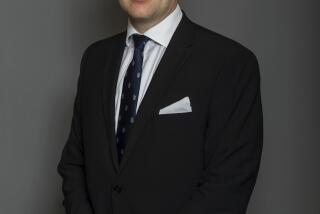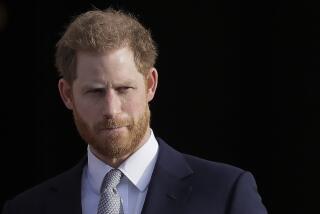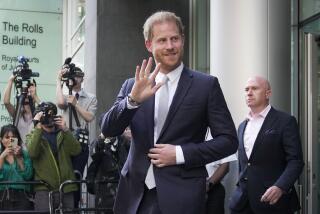Phone hacking scandal puts James Murdoch’s career on the line
James Murdoch is fighting for his professional life, as a growing scandal engulfs his family and the media conglomerate they control.
On Thursday, the News Corp. heir apparent returns to Parliament for a second round of questions about his role in the British phone hacking case. The legislative body is investigating whether it was misled by News Corp. executives, perhaps by Murdoch himself, as members explored the unscrupulous tactics employed by the company’s now-defunct London tabloid News of the World in pursuit of salacious scoops.
Rupert Murdoch’s 38-year-old son, who runs News Corp.’s European operations, is in the cross hairs of their inquiry. In July, when Rupert and James appeared before the committee, James Murdoch said he was unaware of the extent of the illegal conduct at the News of the World until late last year. Within 24 hours, two former tabloid executives called James Murdoch’s truthfulness into question by offering a different account.
“This is an unusual inquiry,” Tom Watson, a member of Parliament’s Culture, Media and Sport Committee, said in an interview. “If we publicly find that Parliament was misled during an inquiry of this powerful company, then misled again by James Murdoch .... it will cause huge reputational harm to the company.”
The executive has more than his reputation at stake. Just six months ago, the youngest son of News Corp. chief Rupert Murdoch was considered the rising star in the family’s sprawling media empire, which includes the Fox broadcast network, Fox News Channel, the 20th Century Fox movie studio, HarperCollins book publishing and a portfolio of newspapers that includes the Wall Street Journal. In March, he was promoted to deputy chief operating officer, the No. 3 executive position in the company. The phone hacking scandal may derail Rupert Murdoch’s wish to have James succeed him.
There may be legal consequences too. Scotland Yard officials have been investigating allegations that News Corp. journalists bribed police officers for information and illegally listened to voice mail messages left for members of the royal family, sports figures, celebrities and crime victims. Sixteen people have been arrested in the widening probe, including Rebekah Brooks, who had just resigned as chief of the company’s British newspaper unit.
James Murdoch could face criminal charges if police investigators determine he was involved in a conspiracy to cover up a crime. However, his appearance before Parliament will not result in charges. He is not testifying under oath, and British law protects him from being prosecuted over his statements to the legislative body. Scotland Yard declined to comment on its investigation, which is expected to continue through next year. Representatives for Murdoch had no comment.
Since July, after the first revelations that News of the World had hacked into the cellphone of a murdered 13-year-old girl, News Corp. executives have been struggling to contain the fallout. The company shut the 168-year-old tabloid and abandoned its $12-billion bid to acquire full control of British Sky Broadcasting, the commonwealth’s largest pay TV service.
The crisis exacerbated tensions among members of the Murdoch clan. News Corp. Chief Executive Rupert Murdoch was conflicted about James’ continued role at the company, suggesting that he take a leave of absence last summer, according to an article in the December issue of Vanity Fair. Rupert Murdoch then had a change of heart.
James’ sister Elisabeth urged their father to temporarily remove him and ditch other top executives tarnished by the damaging disclosures. Even before the scandal became front page news, a psychologist had been brought in to counsel the family about corporate succession.
“It’s kind of like watching ‘Dallas.’ They’re just after each other,” said Quentin J. Fleming, an adjunct professor at USC’s Marshall School of Business and author of “Keep the Family Baggage Out of the Family Business.”
“One of my seven deadly sins is the ‘father knows best’ syndrome,” Fleming said. “I know Rupert has said he wants one of his children to run [News Corp.], but … does he really want that?”
Some inside News Corp. are doubtful that the Murdoch scion can survive the crisis. Others close to James — who is known for being blunt, bright and tenacious — say he believes the facts will support his version of events. Last week News Corp. reaffirmed its support. “We have great confidence in James,” Chief Operating Officer Chase Carey said. “James has done a good job.”
James Murdoch is expected to tell Parliament that he was not shown an incriminating piece of evidence that has become pivotal to the Parliament investigation.
At issue is what he knew and when he knew it. In 2008, he authorized a $1-million settlement of an invasion of privacy suit brought by Gordon Taylor, CEO of the Professional Footballers Assn. A private investigator hired by News of the World who since has served jail time confessed to breaking into Taylor’s phone messages.
Confidentiality and Taylor’s silence were key components of the settlement. But in Britain it is illegal to silence a crime victim. “James Murdoch paid an astronomical sum in the settlement of a case in which a story was never written,” Watson said. “It came with a confidentiality clause, meaning he knowingly bought the silence of a victim of a crime.”
Scotland Yard would make that determination. The police agency has reopened its investigation into alleged phone hacking and police bribery by tabloids in London. Last week, a reporter for the Sun, a News Corp. paper, was arrested in connection with the police bribery probe — the first time accusations of wrongdoing extended beyond News of the World.
News Corp. said it would set up a fund to compensate victims of the phone hacking.
In October, at News Corp.’s annual shareholder meeting, about 70% of independent investors who voted opposed returning James Murdoch to the company’s board of directors. He survived the challenge because the Murdoch family controls nearly 40% of the company’s voting shares. Later this month, he will stand for reelection as chairman of British Sky Broadcasting.
“There will be calls for him to step down,” said Claudio Aspesi, a London-based media analyst with Bernstein Research. News Corp.’s control of BSkyB voting shares will make it difficult for shareholders to unseat him, Aspesi said.
For now, his test will be to convince British lawmakers that he approved the Taylor settlement in 2008 without bothering to delve into the sordid details. He is expected to stand by earlier statements that he was unaware of the extent of the unethical behavior.
“James Murdoch would like to give the impression to you that he was mildly incompetent rather than thoroughly dishonest,” Mark Lewis, the lawyer who represented Taylor, told Parliament last month.
On Monday, News Corp.’s British unit acknowledged it had inappropriately conducted surveillance of two lawyers who represented victims of alleged phone hacking by the company, including Lewis. The company said no one currently working within News Corp. “condoned” the monitoring.
In an interview last week, Lewis said: “This is like a house of cards that is falling down.”
Times staff writer Janet Stobart in London contributed to this report.







